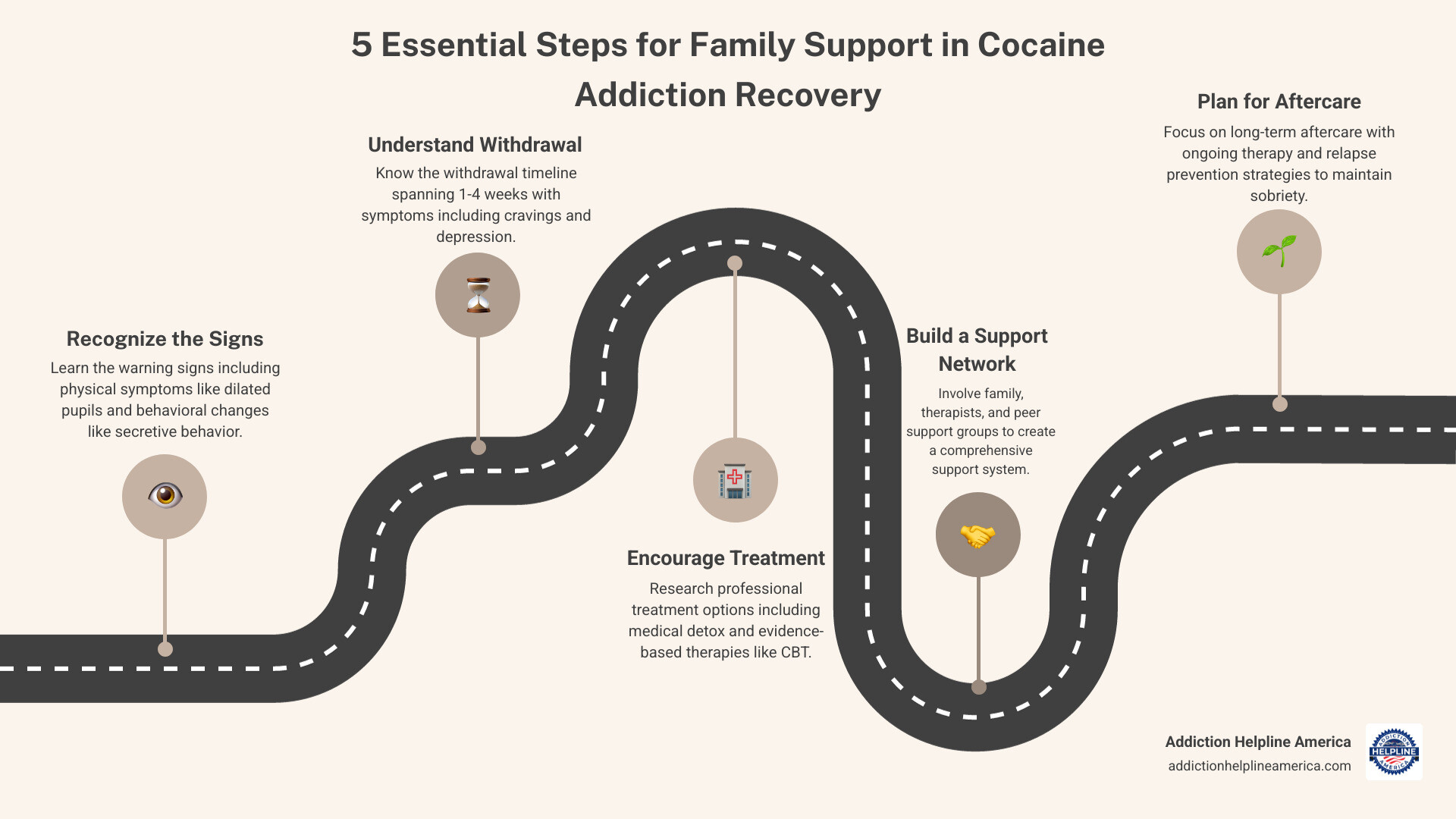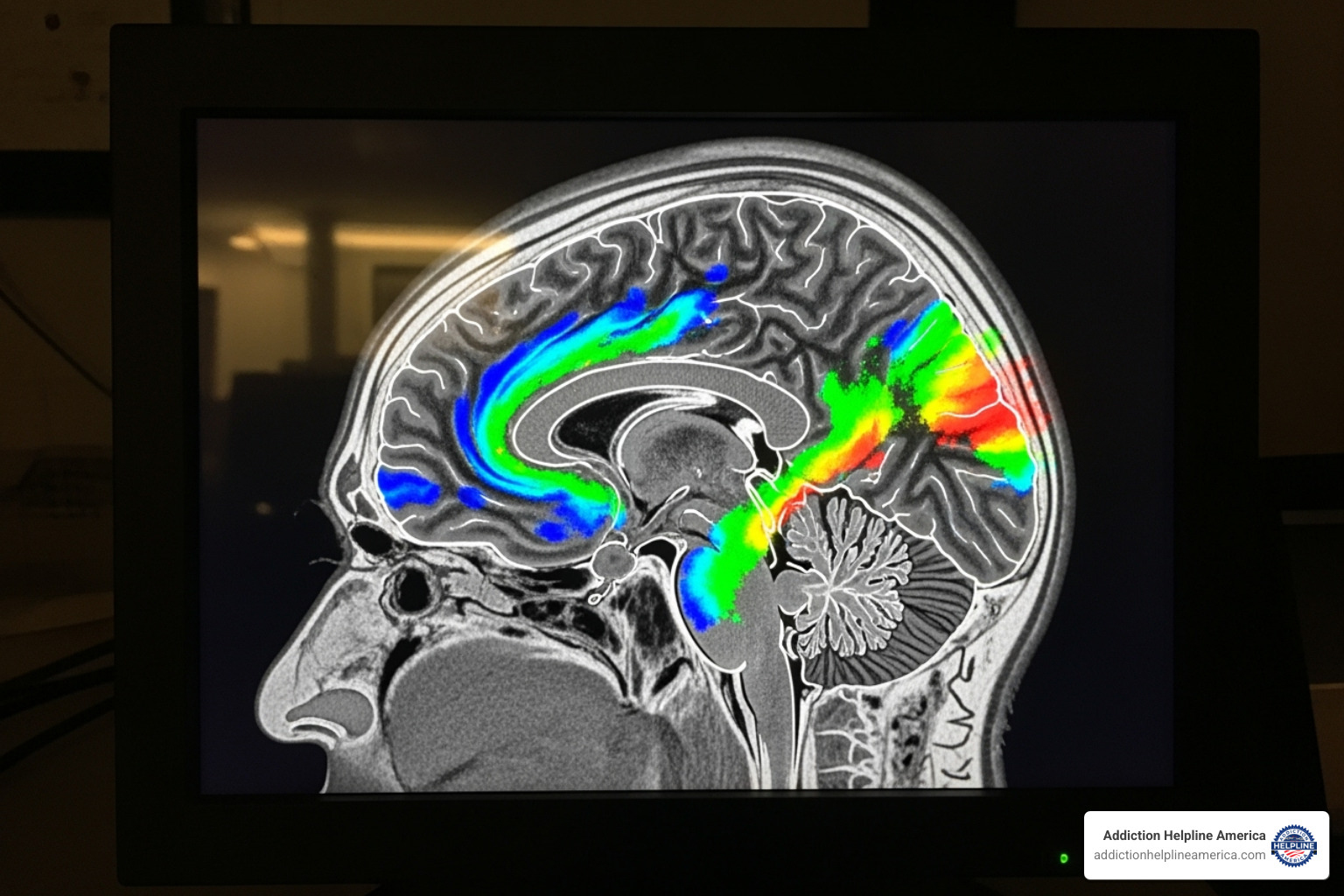
Why Understanding Cocaine Addiction Recovery Is Critical for Families
Cocaine addiction recovery is a complex journey requiring professional treatment, strong support, and a deep understanding of the process. When a loved one struggles with cocaine addiction, knowing how to help can mean the difference between continued use and successful recovery.
Key Steps for Supporting Cocaine Addiction Recovery:
- Recognize the signs – Physical symptoms (dilated pupils, weight loss) and behavioral changes (mood swings, secrecy).
- Understand withdrawal – Symptoms include intense cravings, depression, and fatigue, lasting 1-4 weeks.
- Encourage professional treatment – Medical detox and therapy significantly improve success rates.
- Build a support network – Family, peer groups, and ongoing therapy are crucial for long-term recovery.
- Focus on aftercare – Continued support and relapse prevention planning help maintain sobriety.
Research shows that approximately 60% of patients remain cocaine-free at 3 months, especially when families are involved. However, cocaine powerfully alters the brain’s reward system, making it extremely difficult to quit without professional help.
The impact on families is devastating. As one provider notes: “Cocaine deaths were nearly 10 times higher in 2023 than a decade earlier, claiming more than 1,100 lives.” But with the right support, recovery is absolutely possible.
At Addiction Helpline America, we’ve helped thousands of families steer cocaine addiction recovery. Our 24/7 support services and treatment referrals recognize that recovery affects the entire family.
Understanding the Grip of Cocaine Addiction
When someone you love is struggling with cocaine addiction, it can feel impossible to understand how they got trapped in this cycle. The truth is, cocaine creates one of the most powerful addictions known to medicine, and understanding why can help you approach cocaine addiction recovery with compassion rather than judgment.
Why Cocaine is So Addictive
Cocaine floods the brain with dopamine, the “feel-good” chemical, creating an intense rush far beyond natural rewards. To protect itself, the brain reduces its own dopamine production and receptors. This creates a cruel trap: without the drug, the person can barely feel pleasure from normal activities.
As addiction hijacks the brain, it becomes convinced it needs cocaine just to function. Tolerance builds rapidly, meaning more of the drug is needed for the same effect, and intense cravings and psychological dependence take hold with frightening speed.
Recognizing the Signs: Physical and Behavioral Changes
People often try to hide cocaine use, but there are telltale signs. Physically, look for dilated pupils, a persistent runny nose, and sudden weight loss. You may also see bursts of intense energy followed by crashes of exhaustion and depression.
Behavioral changes can be heartbreaking. Secretive behavior and lying become common, and unexplained financial troubles may appear. They might start neglecting responsibilities at work or home. Mood swings can be extreme, from euphoria to irritability or paranoia. These are not character flaws but symptoms of cocaine’s effect on brain chemistry.
Long-Term Effects on Health
The long-term consequences of cocaine use are serious, as highlighted by the rising toll of cocaine use.
- Cardiovascular damage: Cocaine puts immense stress on the heart, increasing the risk of heart attack and stroke, even in young people.
- Respiratory system: Smoking crack cocaine can cause chronic lung damage, while snorting often leads to permanent damage to nasal passages.
- Cognitive and mental health: Over time, users can develop memory problems, poor concentration, and difficulty with decision-making. Severe depression, anxiety, and psychosis can also emerge, complicating cocaine addiction recovery.
The good news is that many of these health effects can improve significantly with treatment and sustained sobriety. The brain has an amazing ability to heal.
The Path to Cocaine Addiction Recovery: A Step-by-Step Guide
The journey toward cocaine addiction recovery can feel overwhelming, but understanding what lies ahead makes it less frightening. Recovery begins with getting through withdrawal safely, then finding the right treatment approach to build a foundation for lasting sobriety. While the path isn’t always easy, thousands of people successfully overcome cocaine addiction every year.
Navigating the Cocaine Withdrawal Timeline
Cocaine withdrawal begins within hours of the last dose as the brain readjusts. Understanding the effects of cocaine withdrawal helps families know what to expect.
- The crash phase (first few hours to days): Expect intense fatigue, increased appetite, powerful cravings, and a dramatic mood drop.
- Acute withdrawal (days to weeks): This phase is marked by severe psychological symptoms like depression, anxiety, and irritability. The emotional pain can be intense.
- Post-acute withdrawal syndrome (PAWS): Lingering symptoms like mood swings and occasional cravings can last for months but gradually improve with support.
Due to the intense depression that can occur, professional medical supervision is always recommended during withdrawal.
Effective Treatment Options for Cocaine Addiction Recovery
Successful recovery typically combines several approaches.
- Medical detoxification: Professional detox is crucial for managing severe depression and potential suicidal thoughts.
- Inpatient rehabilitation: This provides a protected environment for focusing completely on recovery. It’s best for severe addiction or co-occurring mental health issues.
- Outpatient programs: These allow individuals to live at home while attending treatment, offering flexibility and a lower cost.
Therapy is a core component, including individual, group, and family counseling to heal relationships and build a support system. Statistics are encouraging: 49% of people successfully complete treatment, and longer treatment durations significantly reduce relapse rates.
The Role of Therapy in Recovery
Since there are no FDA-approved medications specifically for cocaine addiction, behavioral therapies are the most effective treatments.
- Cognitive Behavioral Therapy (CBT): As a common and effective therapy, CBT helps people identify and change the thought patterns that lead to drug use.
- Contingency Management: This approach uses positive reinforcement, offering tangible rewards for maintaining sobriety.
- Motivational Interviewing: This helps individuals find their own internal motivation to get sober and commit to change.
Finding the right therapeutic fit is key, and it’s important to stay engaged in the process.
Building a Strong Foundation for Lifelong Sobriety
Achieving sobriety is a tremendous accomplishment, but cocaine addiction recovery is a marathon, not a sprint. Building a strong foundation for lasting sobriety involves cultivating new habits, surrounding oneself with a supportive community, and developing robust relapse prevention strategies.
Creating a Powerful Support Network
Recovery isn’t a solo journey. A strong support network is vital.
- Sober friends and peer support groups like Cocaine Anonymous offer understanding from those who have walked the same path.
- Family involvement is key, often requiring rebuilding trust through open communication and family therapy.
- Therapists and sponsors act as professional guides and mentors, providing expertise and day-to-day guidance.
Positive social support dramatically increases the chances of staying sober.
Healthy Habits That Support Cocaine Addiction Recovery
Recovery is about rebuilding your life around healthy choices that help the brain and body heal.
- Nutrition and Exercise: A balanced diet and regular physical activity help restore brain chemistry, stabilize mood, and reduce stress.
- Sleep: Consistent, quality sleep is crucial for repairing the body and improving the ability to handle stress.
- Mindfulness and Hobbies: Meditation can strengthen willpower, while refinding hobbies provides purpose and joy without substances.
Identifying and Managing Relapse Triggers
Relapse doesn’t mean failure; it means the recovery plan needs adjustment. Recognizing triggers is key.
- External Triggers: Be aware of people, places, and things associated with past drug use.
- Internal Triggers: Stress is a major trigger. The HALT principle reminds us that being Hungry, Angry, Lonely, or Tired makes us vulnerable.
Developing coping strategies and creating an emergency plan are essential. This means having a toolkit for difficult moments, including people to call and steps to take when cravings hit. At Addiction Helpline America, we’ve seen how having this kind of plan can be the difference between a moment of weakness and a full relapse.
How Loved Ones Can Provide Effective Support
When someone you care about is struggling with cocaine addiction recovery, your role as a family member or friend becomes incredibly important. Your support can be the difference between giving up and pushing forward, but it’s crucial to understand that there’s a right way and a wrong way to help.
The journey of cocaine addiction recovery affects the entire family. You might feel angry, scared, or helpless. These feelings are normal. What matters most is learning how to channel your concern in ways that truly help.
The Do’s and Don’ts of Helping
Supporting someone through cocaine addiction recovery requires balancing love with firm boundaries.
- DO educate yourself about addiction as a brain disease to respond with compassion.
- DO encourage professional treatment and offer practical help, like researching centers or providing transportation.
- DO set clear boundaries, such as not providing money or covering for their mistakes. Boundaries are acts of love, not punishment.
- DON’T enable the addiction by shielding them from the natural consequences of their actions.
- DON’T use blame or shame. These tactics only deepen feelings of worthlessness and can push them further into drug use.
The Importance of Aftercare and Peer Support
Recovery is a lifelong process that requires ongoing support.
- Ongoing therapy helps develop coping skills for sober living.
- Peer support groups like Cocaine Anonymous provide understanding from shared experience.
- Sober living homes offer a structured, drug-free environment to bridge the gap between treatment and everyday life.
Key predictors for success are self-efficacy (your loved one’s belief in their ability to stay sober) and commitment to abstinence. You can strengthen these by celebrating their progress and supporting their recovery goals.
Caring for Yourself: Support for Families
Taking care of yourself isn’t selfish—it’s essential. You cannot support someone else’s healing if you are falling apart.
- Recognize caregiver burnout: Be aware of your own stress, anxiety, and depression.
- Set boundaries for yourself: Protect your own mental health by deciding what you will and won’t accept.
- Seek your own support: Individual therapy or family support groups like Nar-Anon connect you with others who understand.
Your loved one’s cocaine addiction recovery is their responsibility. You can offer support and love, but you cannot control their choices. Focus on how you respond and care for yourself.
Frequently Asked Questions about Cocaine Recovery
How long does cocaine recovery take?
Cocaine addiction recovery is a lifelong journey. The acute withdrawal phase typically lasts 1-2 weeks, but Post-Acute Withdrawal Syndrome (PAWS) can linger for months with symptoms like mood swings and anxiety. Formal treatment programs might last 30, 60, or 90+ days, with longer stays linked to better long-term outcomes.
What is the success rate for cocaine addiction?
Success rates vary. Research shows about 50% of patients remain cocaine-free after 3 months. However, recovery is a dynamic process, and relapse is common but not failure. Factors that improve success, according to scientific research on recovery predictors, include self-efficacy, commitment to abstinence, and participation in self-help groups.
Can someone quit cocaine without professional help?
While technically possible, quitting without professional help is incredibly difficult and often unsafe. Cocaine withdrawal brings severe psychological symptoms, including intense depression and suicidal thoughts, that require professional monitoring. Professional support dramatically increases the chances of long-term success by providing medical supervision and evidence-based therapies.
Are there any medications that can help manage cocaine addiction or withdrawal symptoms?
Currently, there are no FDA-approved medications specifically for treating cocaine addiction. However, some medications are used off-label to help manage symptoms and cravings alongside behavioral therapies. These may include Baclofen, Disulfiram, and Modafinil. Medications are also often prescribed to treat co-occurring mental health disorders like depression or anxiety. Always consult a qualified healthcare professional.
What resources are available for individuals seeking help for cocaine addiction?
Numerous resources exist to support individuals and families.
- National Helplines: SAMHSA offers a national helpline and an online treatment locator. The National Institute on Drug Abuse (NIDA) provides information on effective treatments.
- Peer Support Groups: Cocaine Anonymous, Narcotics Anonymous, SMART Recovery, and LifeRing Secular Recovery offer different approaches to peer support.
- Family Support: Nar-Anon, Learn to Cope, and the Family Resource Center provide resources for families.
At Addiction Helpline America, we understand that finding the right resources can feel overwhelming. That’s why we’re here to provide free, confidential guidance to help you find the treatment approach that fits your specific needs.
Conclusion
Cocaine addiction recovery is a challenging yet transformative journey. While cocaine’s grip on the brain is powerful, this guide has shown that with the right approach, freedom from addiction is achievable.
The science is clear: professional treatment, strong support networks, and evidence-based therapies are essential for overcoming cocaine addiction. Recovery isn’t always a straight line, and setbacks can be part of the process. Relapse is not failure, but an opportunity to adjust the recovery plan.
Statistics show that recovery is possible, with success rates improving significantly with family involvement and commitment to aftercare. The key ingredients for success include building self-efficacy, participating in peer support groups, and managing any underlying depression or mental health challenges.
For families watching a loved one struggle, your support can make all the difference. Learning how to help effectively—through encouragement, setting healthy boundaries, and caring for your own well-being—creates the foundation for lasting change.
The journey may feel overwhelming, but you don’t have to steer it alone. At Addiction Helpline America, we understand that every person’s path to recovery is unique. That’s why we’re here 24/7 to provide free, confidential guidance and connect you with treatment programs specifically designed to meet your individual needs.
Recovery is possible. Hope is real. And help is just a phone call away.
Find a personalized recovery program today – because taking that first step toward healing is the most important decision you’ll ever make.
Our helpline is 100%
free & confidential
If you or someone you care about is struggling with drug or alcohol addiction, we can help you explore your recovery options. Don’t face this challenge alone—seek support from us.
Programs
Resources
Will my insurance
cover addiction
treatment?
We're ready to help
Find the best
drug or alcohol treatment
center
Are you or a loved one struggling with addiction? Call today to speak to a treatment expert.

















